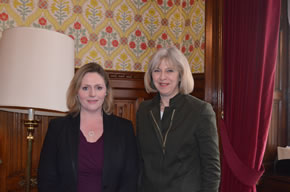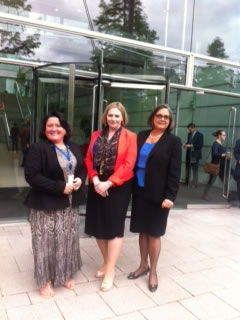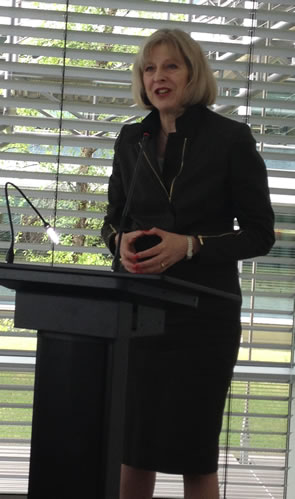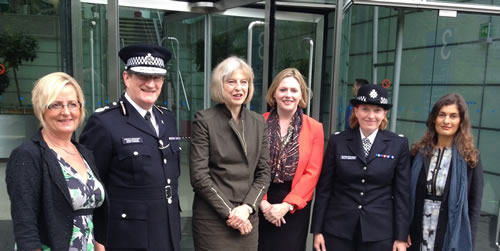Police 'Must Do More' To Support Victims Of Domestic Violence
Home Secretary at event in Chiswick organised by local MP Mary Macleod
The Home Secretary, Theresa May has pledged to ring-fence central government funding to help victims of domestic violence but said local authorities also had to play their part in deciding how to prioritise the issue in their budgets.
She was on a visit to Chiswick -home of the first Refuge centre for domestic violence victims - to address an audiance of schools, charities, police, Crime Prosecution services and health professionals. The event was organised by local MP Mary Macleod to discuss practical ways forward to tackle the issue.
A total of 77 women died in 2012/2013 in the UK at the hands of their current or former partners.
Following a HMIC (Her Majesty's Inspectorate of Constablary) report last March, which found that domestic abuse was often a "poor relation" to other policing activity, the Home Secretary said she had recently chaired a National Oversight group to ensure police forces take decisive action over failings in culture, attitude and core skills. Mrs. May said that tackling domestic violence was one of her top priorities since her appointment as Home Secretary. She described domestic violence as "an appalling crime."

(l-r) Mary Macleod with the Rt Hon Theresa May
She recently wrote to chief constables making clear that every police force must have an action plan in place by September to improve their response to domestic violence and abuse.
The Home Secretary said that there had been some important developments lately. New Domestic Violence Protection orders could be used by police to protect victims and last week legislation had come into force banning forced marriages.
MP Mary Macleod, who organised the event, said she would continue to ask Hounslow Council to give priority to victims of domestic violence to be rehoused and not just on a temporary basis.
Commenting before the event, Mary said:
“Almost 1 in 3 women and 1 in 6 men have experienced domestic abuse at some point in their life, and police receive a phone call every minute about it. We need to make dealing with domestic violence a priority in practice and not just on paper – we need practical ways to make that happen.”

(l-r) Local Cllr Sue Sampson, Mary Macleod and Sandra Horley of Refuge
Sandra Horley CBE, Chief Executive of Refuge, said;"It is essential that the police - and other agencies - improve the way they respond to abused women and children. Domestic violence will not end until we all work together to protect victims and bring justice to those who perpetrate this horrific crime."
Theresa May said that it was very clear that first responders to a case, which was often the police, were properly equpped to deal with the situation . She also cited the importance of GP's being trained to ask questions that might lead to helping identify victims of violence.
Other speakers from the floor talked about the importance of breaking the 'cycle' of domestic violence from those abused as young people going in to be abusers; of the importance of the business community being equipped to deal with employees who might be victims of abuse ; of recognising that domestic violence is also not gender-specific to women; and of the importance of young people being educated on how to develop healthy elationships as adults.

Theresa May speaking at the event
James Whiting, deputy-head of Chiswick School, said the government should make PSHE (Personal, Social, Health and Economic education) a statutory provision in schools and it was "absurd" that it was not. Students needed to be educated about maintaining healthy relationships and it would help to break the 'cycle' of domestic abuse where a young girl might go on to accept violent behaviour from a boyfriend or partner because of her early experiences in the family. Mary Macleod said she would speak to the Education Secretary to see what could be done to raise awareness in schools.
Hounslow Superintendent Sally Benator, on the topic of 'intervention', said the police would welcome third party reports from schools or from any of the usual channels, and they worked with a number of multi-agency groups. When officers attended a crime involving domestic violence they tried to identify if there were vulnerable children or young people so they could receive help.
A support centre for victims of crime was recently launched at West Middlesex Hospital to help those affected by domestic and sexual violence. The centre has a year's funding from Hounslow Council and is open from Monday to Friday between 5 pm and 8pm.

- from left to right, Shan Jones, West Middlesex University Hospital; Deputy Assistant Commissioner Mark Simmons, Metropolitan Police Service; Rt Hon. Theresa May MP, Home Secretary; Mary Macleod MP; Superintendent Sally Benatar, Hounslow Police; Yeliz Osman, Mayor’s Office for Policing and Crime.
*In September 2013, HMIC was commissioned by the Home Secretary to inspect the police response to domestic violence and abuse. The report, Everyone’s business: Improving the police response to domestic abuse, found that, while most forces and police and crime commissioners said that domestic abuse is a priority for their areas, this was not being translated into an operational reality.
"HMIC is concerned to find that, despite the progress made in this area over the last decade, not all police leaders are ensuring that domestic abuse is a priority in their forces – it is often a poor relation to other policing activity".
June 17, 2014
Related links
|
